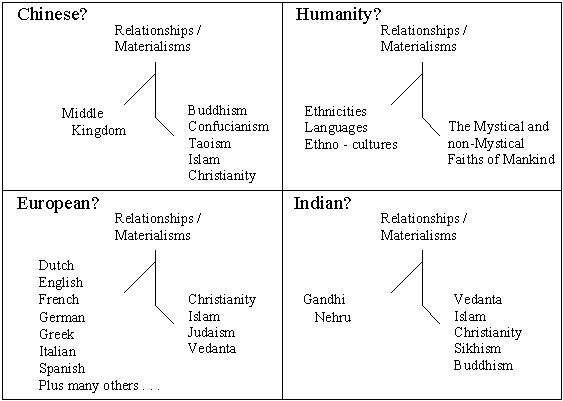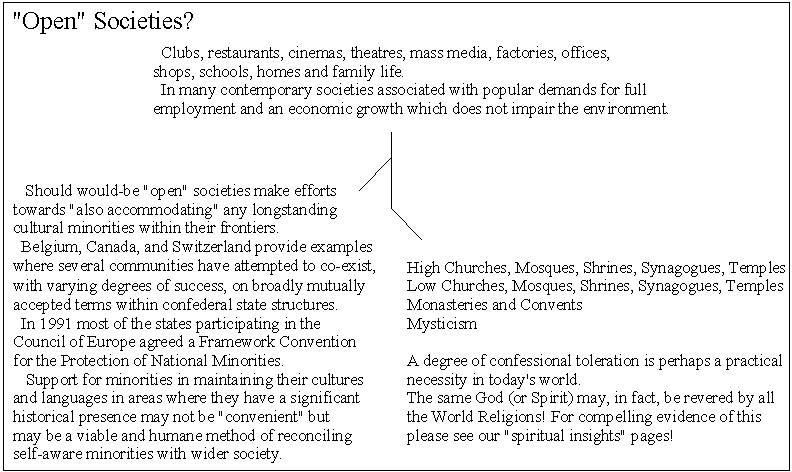![[social construction]](enlightenment.gif)
human nature
Social Construction of Reality![[social construction]](enlightenment.gif) human nature |
| Home > Social Construction of Reality |
|
|||
"Mankind are so much the same, in all times and places, that history informs us of nothing new or strange in this particular. Its chief use is only to discover the constant and universal principles of human nature."
David Hume

You can find key insights, (from the Great Faiths, Plato, Socrates,
Pythagoras, and Shakespeare!!!),
on several of our pages that give convincing support to this view of Human Nature!!!
"...man is a bundle of relations, a knot of roots,
whose flower and fruitage is the world..."
Ralph Waldo Emerson

"Whatever concept one may hold, from a metaphysical point of view, concerning the freedom of the will, certainly its appearances, which are human actions, like every other natural event, are determined by universal laws. However obscure their causes, history, which is concerned with narrating these appearances, permits us to hope that if we attend to the play of freedom of the human will in the large, we may be able to discern a regular movement in it, and that what seems complex and chaotic in the single individual may be seen from the standpoint of the human race as a whole to be a steady and progressive though slow evolution of its original endowment."
Immanuel Kant
Idea for a Universal History from a Cosmopolitan Point of View (1784)
Or to quote Emerson, from his famous Essay ~ History more fully:-
"In old Rome the public roads beginning at the Forum proceeded north, south, east, west, to the centre of every province of the empire, making each market-town of Persia, Spain, and Britain pervious to the soldiers of the capital: so out of the human heart go, as it were, highways to the heart of every object in nature, to reduce it under the dominion of man. A man is a bundle of relations, a knot of roots, whose flower and fruitage is the world. His faculties refer to natures out of him, and predict the world he is to inhabit, as the fins of the fish foreshow that water exists, or the wings of an eagle in the egg presuppose air. He cannot live without a world."
![]()
"There is one mind common to all individual men....
....Of the works of this mind history is the record. Man is explicable by nothing less than all his history. All the facts of history pre-exist as laws. Each law in turn is made by circumstances predominant. The creation of a thousand forests is in one acorn, and Egypt, Greece, Rome, Gaul, Britain, America, lie folded already in the first man. Epoch after epoch, camp, kingdom, empire, republic, democracy, are merely the application of this manifold spirit to the manifold world."
From Ralph Waldo Emerson's Essay ~ History
![]()
Please recommend this page to any of your friends who might be interested!!!
|
Our view of reality may not be entirely, or even mainly, "Rational" but may rather be a Human / Social Construction of Reality that is itself based on the promptings and cues provided by innate Human Nature. Early peoples probably lived in tribes rather than in "Open" societies.
Intergroup DiscriminationIt seems that also arising out of our tribal past there is a tendency to favour our "own" group and to discriminate against "out" groups. This tendency towards Intergroup Discrimation would presumably have given the in-group some advantage in survival terms. The Unfolding of History
As members of tribes across historic time individual human beings may have needed inherent
functionality that would allow the tribe to be internally harmonious (spirituality),
self-regenerating (desire), and self preserving (manhood).
Perhaps the most revealing phase of this whole interplay between monarchical Europe, the more longstanding claims of Liberal constitutionalism and the emergent claims of nationalism and socialism was played out in the revolutions of 1848-9. The early phase of this revolution where traditional monarchical rule was variously challenged has been depicted by some as a "springtime of the nations." The European Revolution of 1848 Although monarchical Europe was largely re-established after this period of revolution it was tested across subsequent decades by a number of powerful nationalistic movements. That being said there were two notable instances of Dynastic houses supporting policies whereby national sentiment was exploited in achieving extensions of their realms. These instances being that of Sardinia-Piedmont (Cavour) and Prussia (Bismarck).
The shift in sentiment away from Monarchical Sovereignty towards Popular Sovereignty was
fraught with consequences. Where several communities had lived in relative harmony under
the pre-existing monarchical sovereignty there was scope for dire disputations arising out
of divergent identifications with emergent sovereign nations. Whilst a monarchical
state may have been
somewhat, and possibly reluctantly, prepared to function as an "Open" society
it often happened that peoples who had been variously brought into association with
Kingdoms and Empires aspired to seek to establish themselves in political
independence.
Human history has featured many instances of turmoil and injustice in the past and, if
Peace on Earth between People of Goodwill is to be our goal, we may ask whether this goal
may be better achieved in the future if we attempt to facilitate ALL the
majorities and minorities
of the Earth in enjoying the basic forms of Felicity. There is a general acceptance in
today's world that minorities
should be protected and accommodated rather than persecuted and assimilated.
|
|
Start of
Social Construction of Reality